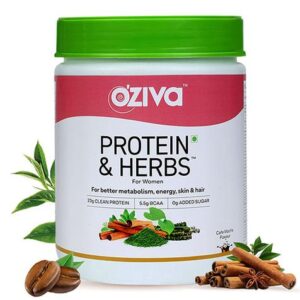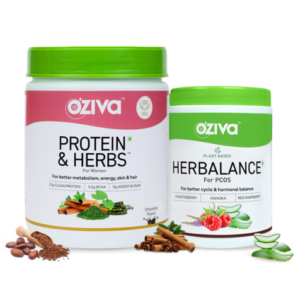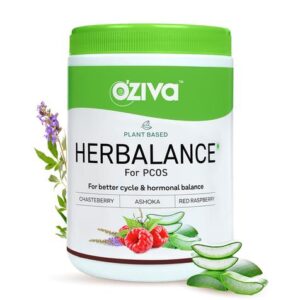What is PCOD/PCOS? (Polycystic Ovary Disease/Polycystic Ovary Syndrome). PCOD is a condition where women experience hormonal imbalances in the body.One in every 5 Women in India has PCOD. But unfortunately, they aren’t aware of both PCOS and PCOD. PCOD side effects are numerous. It is linked to degenerative diseases like Type 2 Diabetes, Insulin resistance, Obesity, Hypertension, Dyslipidemia, etc. The presence of small cysts on the uterus can trigger severe acne, excessive hair growth, oily skin and weight gain.
Symptoms of PCOD Problem in Females
PCOD affects women’s reproductive systems by affecting the ovaries which produce the female hormones – Estrogen and Progesterone, which play a major role in regulating the menstruation cycle.
- Growth of Cysts – Many small sac-like cysts filled with fluid grow inside the ovaries as PCOD side effects. These cysts are follicles that may contain incompletely matured or completely immature eggs, these eggs cannot trigger the menstrual cycle, thus impairing the regular cycle
- Hormonal Imbalance – Absence of the menstrual cycle leads to alteration in the levels of all hormones – Estrogen, progesterone, LH and FSH. Thus one of the PCOD side effects is decreasing the estrogen and progesterone levels and increasing the production of male hormone – Testosterone than normal levels.
All these further lead to all the PCOD side effects and related problems in the body.
Suggested read – PCOS: Symptoms and What You Can Do to Manage Them
But what can cause PCOS and PCOD?
The exact causes of PCOS and PCOD can vary. According to scientific studies the following factors can lead to PCOS and PCOD –
- Genetics – Genes can be a major cause of PCOS and PCOD. Genes passed to you from your family can put you to 50% risk of PCOD.
- Insulin Resistance – The link between PCOD and insulin resistance is very well established. Insulin resistance occurs when cells in the body are unable to use insulin for uptake of glucose which increases the body’s demand for insulin thus leading to excess insulin production by the pancreas. The excess production of insulin can impair ovulation and can trigger the ovaries to produce more male hormones like testosterone, thus leading to symptoms of PCOS and PCOD
- Weight – Increase in weight above your Ideal weight can worsen your Insulin resistance contributing to PCOD or Polycystic Ovary Syndrome. Also high inflammation levels are observed in women with increased weight which is associated with major PCOS symptoms in females.
Not knowing the exact cause of the PCOD side effects – genetics, insulin resistance and obesity are considered as the root to all the symptoms of PCOS and PCOD.
Suggested read – Do you have PCOS? Here are the first few signs that can tell you!
Confused about whether you have PCOD? Here are a few PCOD symptoms to look out for :
- Irregular menstrual cycles (Irregular Periods) – Irregular menstruation can occur as a result of high testosterone (male hormone) levels in the body thus impairing the ovulation cycle. As per research studies women with PCOS and PCOD get fewer than 8-9 periods a year.
- Excess hair growth (Hirsutism) – Due to increased levels of testosterone in the body there is excess production of hair on the face, chest, back and belly. Around 90% of women with PCOS and PCOD experience this PCOS symptom.
- Weight gain – Studies show around 90% women with symptoms of PCOS and PCOD are either overweight or obese.
- Acne – The male hormone testosterone can make the skin oilier comparatively causing acne on the face, chest and back.
- Dark patches on skin – Elevates levels of insulin hormone in the body can cause darkening of the skin on face, groin area, underarms and neck.
- Male pattern baldness – High levels of testosterone produced is converted to Dihydrotestosterone (DHT) in the body which interferes with hair growth and causes hair thinning resulting in male pattern baldness.
An Effective Solution to the PCOD Problem Symptoms – ZIV APPROACH
The things that we underestimate in our life are the ones that work wonders! These small lifestyle changes can help you improve hormonal balance. You just need to make ZIV a habit and a part of your lifestyle. It is a 3-pronged daily approach that includes:
- 55:35:10 Diet
- 7 Ayurvedic Herbs & Condiments
- 20 Min Exercise Rule
Explaining all 3 in Detail Below
55:35:10 Diet
The exact solution to PCOD problem symptoms is not known. But the symptoms of PCOS and PCOD can be definitely managed by modifying unhealthy dietary practices. Opt for a daily diet which has a Carbohydrates : Protein : Fat ratio of 55:35:10. That means, the calories that you eat on a daily basis are derived from these macronutrients in the ratio that is closer to the one above.
Increase your Protein Intake ( On 1200 kcal diet, opt for 90-95 g of protein daily)
Eating a well balanced diet in PCOS and PCOD is very important. Protein is a very important nutrient for lean muscle and recovery. High protein diet for PCOS and PCOD can help manage insulin resistance as protein when compared with carbohydrates doesn’t spike up the production of insulin which also helps in losing weight solving the major PCOD problem symptoms. It is very important to choose the protein source wisely as eating more red meat may lead to increased blood cholesterol causing more problems. Include proteins like beans, lentils, eggs, cheese, seeds, nuts, etc.
Avoid Simple Carbs, Have More Complex Carbs
The intake of whole grains like whole wheat, whole oats, Brown rice, Whole barley, Quinoa, Whole Jowar, bajra, etc has to be increased as they are high in fibre as they undergo minimum processing. Foods high in fibre majorly help with insulin resistance which is a major problem to deal with in PCOS and PCOD. Always look for low glycemic foods like multigrain or whole grain flours.
Go for 1-2 Servings of Whole Fruits & Vegetables
Try making your plate as colourful as possible with different fruits and vegetables. Avoiding the intake of fruits on PCOS and PCOD is a myth. It is true that they contain a little more carbohydrates which can worsen insulin resistance, taking 1-2 servings of fruits daily will rather help manage insulin resistance, PCOS and PCOD by reducing inflammation as fruits are known to provide very good amounts of fibre, vitamins & minerals and antioxidants. One fruit serving:
- 1 medium sized apple
- 1 Orange
- 1 Pear
- 1 Pomegranate
- 1 cup grapes
- 1-2 slices watermelon
- 1-2 slices papaya
- 1 medium sized banana
Limit Milk & Milk Products to 1 Serving a day (in case you can’t avoid)
Dairy consumption may elevate the levels of insulin in the body which can trigger excessive production of testosterone further causing serious acne. Milk products along with protein contain a good amount of carbohydrates which can also lead to high insulin levels. Growth stimulating hormones like Insulin Growth Factor 1 (IGF-1) and Dihydrotestosterone (DHT) are present in dairy which triggers excessive sebum production and thus causes acne.
Suggested read – Conversations with OZiva: Let’s Talk About PCOS!
No guidelines are available as to how much dairy consumption is required or to avoid dairy completely in PCOS and PCOD. It is advisable to women with PCOS and PCOD to not have more than 1 serving a day.
Add Omega 3 to your diet
Consuming omega 3 in PCOS and PCOD may also decrease the inflammation caused by insulin resistance or obesity. Omega 3 sources involve – walnuts, flax seeds, chia seeds. Women suffering from PCOS and PCOD should avoid consuming saturated & trans fats. These unhealthy fats can elevate the blood cholesterol and sugar levels. Sources of saturated and trans fats involve – Ghee, butter, coconut oil, margarine, biscuits, crackers, bakery products, etc. Always check for the nutritional label before purchasing the food items. Stick to healthy fats like olive oil, mustard oil, rice bran oil – these are unsaturated fats rich in MUFA, PUFA and Omega 3.
Limit Coffee Intake to once a day (if you can’t avoid)
Caffeine in coffee is believed to worsen the PCOD problem symptoms. It has been studied that drinking more than 2 cups a day produces more estrogen during menstruation thus affecting the hormonal balance.
Herbs & Condiments for PCOS and PCOD
Ashwagandha
It helps treat PCOS and PCOD by helping to correct symptoms of PCOS and PCOD – Irregular menstrual cycle, obesity, infertility, maintaining hormonal balance. It works by reducing the cortisol – a stress hormone and testosterone. Ashwagandha also helps the body use insulin for glucose uptake.
Tulsi
Tulsi which is referred to as “Queen of Herbs” helps resolving PCOD problem symptoms and PCOS symptoms by reducing cortisol levels, blood sugar and preventing weight gain.
Shatavari
Shatavari being a phytoestrogen helps women with PCOS and PCOD to reduce testosterone levels and therefore with insulin resistance. It also contains properties that help restore female reproductive functions while regulating the menstrual cycle.
Green Tea
Green tea has high amounts of antioxidants and is anti-inflammatory in nature. It contains epigallocatechin that helps prevent or slows the conversion of testosterone to Dihydrotestosterone (DHT) thus is a good solution to manage the PCOD problem symptoms.
Flaxseed
Flax Seeds are considered very effective in treating PCOS and PCOD naturally. It contains lignan which binds to testosterone in blood and helps excreting it. Thus having a positive effect on all the testosterone related PCOD problem symptoms or PCOS symptoms.
Cinnamon
Cinnamon helps with regulating the menstrual cycle and reducing insulin resistance for women with PCOS and PCOD.
Curcumin
Curcumin in turmeric has an anti-inflammatory effect and helps decrease insulin resistance.
20 Min Exercise Rule as PCOD problem treatment
HIIT
Exercising for at least 20 minutes daily helps improve insulin resistance, reduces excess weight and increases the metabolism. If you don’t have much time on your plate, opt for functional fitness exercises – a combination of strength and cardio in just 20 mins. One of the best workout styles in this is HIIT ( High Intensity Interval Training). You can find many HIIT videos on youtube.
Yoga
If you aren’t able to do 20 min HIIT, go for 35-40 mins of Yoga daily. This reduces the stress and strengthens the organs affected in PCOS and PCOD which helps prevent aggravating the PCOD symptoms.
Yoga Asanas for PCOS and PCOD:
- Kapalbhati
- Yoni Mudra
- Pawanmuktasana
- Halasana
- Dhanurasana
Bottom line on PCOS and PCOD
PCOS and PCOD can make life of women very difficult by interfering in the normal menstrual cycle and contributing to infertility. Changing the lifestyle pattern is the first thing recommended by many health experts to manage PCOS and PCOD. Reducing weight reduces 50% of PCOD problem symptoms and increases the chances of getting pregnant. ZIV Approach is an effective solution for managing PCOD and problems.
OZiva Plant based HerBalance for PCOS is a combination of 21 Plant Based Whole Foods designed to assist in regulating Hormonal Balance and support Menstrual Cycle in Women.
Last modified: July 16, 2020







